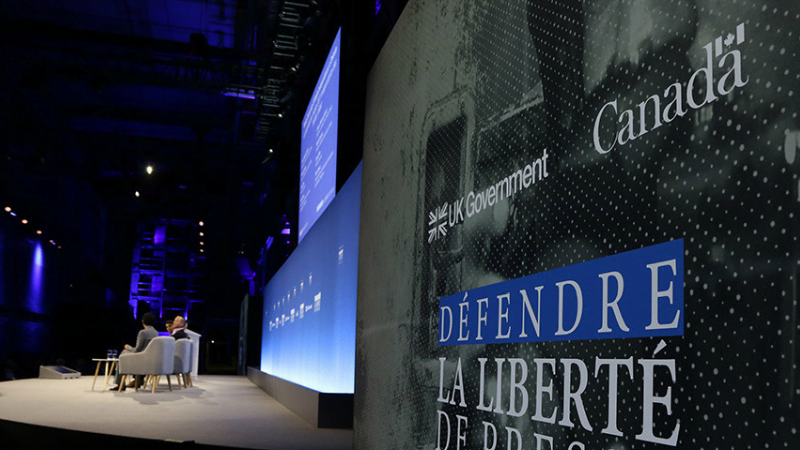While the UK Foreign Office hosted a Global Conference for Media Freedom in London over the last two days, its lawyers were in Strasbourg fighting to continue to spy on the press and limit press freedoms within Europe.
Managing Editor of The Bureau of Investigative Journalism, Rachel Oldroyd, said “This may be the most important case with regards to the protection of journalistic communications and the protection of our sources to be heard in the past 20 years.”
Lawyers acting on behalf of the UK Government are in the Grand Chamber of the European Court of Human Rights defending their mass surveillance programmes, in a case brought by the Bureau of Investigative Journalists and other human rights NGOs against the UK intelligence agencies use of mass surveillance programmes on the press and public.
So the government has just announced a £27M fund to #DefendMediaFreedom around the world – at the exact same time they are paying lawyers to argue in court that they should be able to spy on journalists! Irony seems lost on Whitehall…. https://t.co/rCXQky04IU #PressFreedom https://t.co/PTpmNCaWVc
— The Bureau of Investigative Journalism (@TBIJ) July 10, 2019
Oldroyd said the mass surveillance on the press and public was a “severe impingement on media freedom”. She warned: “As journalists, we must be able to speak freely to our sources without fear of surveillance. The UK government’s system of mass collection and storage of all our communications is a severe threat to this cornerstone of our profession and a severe intrusion upon the freedom of the press.”
The Bureau is arguing that interceptions are unlawful under the ECHR, Article 10 on the Right to Freedom of Expression, as it fails to protect journalistic confidentiality as required by European laws and has implications for European journalists for years to come.
Oldroyd, the Managing Editor of the Bureau, said it was ironic that on the very day the British Government was hosting an international global media freedom summit, the same government was fighting to limit press freedoms in the highest human rights court in Europe.
The British government defended its surveillance regime in Strasbourg by claiming the mass surveillance of public data including journalistic communications is crucial to the intelligence services interests in protecting the public from harm.
“Foreign Secretary Jeremy Hunt is hosting a Global Conference for Media Freedom in London today. Meanwhile, 400 miles away in Strasbourg UK government lawyers are fighting for the right to continue spying on the press.” https://t.co/wP1M3PRhOK
— Sophie Busson (@Sophie_Busson) July 10, 2019
The UK government surveillance programmes were brought to light after the former CIA employee and whistleblower, Edward Snowden revealed how GCHQ and other intelligence agencies were monitoring and also storing the public’s data including journalists’ communications.
In September 2018, after a four-year case brought by the Bureau and NGOs, the ECHR ruled the UK Government GCHQ’s data collection programme violated press freedoms and was in breach of Article 10, of the right to freedom of expression.
The ECHR found in favour of the Bureau and other human rights organisations – ruling the UK Government’s surveillance programme was unlawful as it failed to provide safeguards to protect press freedoms.
The ECHR said this was due to the “Potential chilling effect that any perceived interference with the confidentiality of journalists’ communications and, in particular, their sources might have on freedom of the press.”
The surveillance programme from GCHQ does not require authorisation by a judge or an independent person in order to collect journalists’ communications.
The Bureau wants accountability in order to govern the use of material gained by governments, stating press freedoms can only exist without the mass intrusion of communications and protections are needed to ensure the safety of correspondence with sources so that journalists are able to offer safety and anonymity.
Rosa Curling, a lawyer from Leigh Day Law firm representing the Bureau, explained: “Journalistic privilege is a key aspect to press freedom. Fundamental to a functioning democratic society is the ability of journalists to communicate privately and freely with their sources”.
She said the government must not be allowed to snoop into these privileged communications. “Our client hopes very much that the Grand Chamber will uphold and extend further the principles recognised by the European Court last year.”
Concerns about mass surveillance and its effects on whistleblowers who seek to reveal wrongdoing to journalists and the difficulties of guaranteeing source anonymity when communications are under constant surveillance is a major concern and one the UK Government does not recognise.
The ECHR ruled that the GCHQ surveillance was unlawful under Article 10: “Freedom of expression constitutes one of the essential foundations of a democratic society and that the safeguards to be afforded to the press are of particular importance.”












